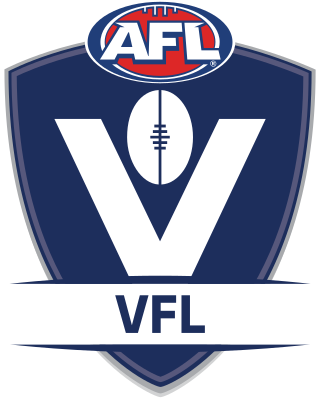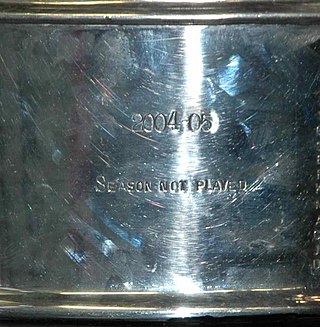Related Research Articles
In sports, a division is a group of teams who compete against each other for a championship.

The Victorian Football League (VFL) is an Australian rules football competition in Australia operated by the Australian Football League (AFL) as a second-tier, regional, semi-professional competition. It includes teams from clubs based in eastern states of Australia: Victoria, New South Wales and Queensland, including reserves teams for the eastern state AFL clubs. It succeeded and continues the competition of the former Victorian Football Association (VFA) which began in 1877. The name of the competition was changed to the Victorian Football League in 1996. Under its VFL brand, the AFL also operates a women's football competition known as VFL Women's, which was established in 2016.
The National League is a professional football league in England that consists of 72 teams, divided equally between the National League (division), National League North and National League South. The National League is one of the major professional sports leagues in England.
Premiership Rugby, officially known as Gallagher Premiership Rugby, or the Gallagher Premiership for sponsorship reasons, is an English professional rugby union competition, consisting of 10 clubs, and is the top division of the English rugby union system.
In professional sports, a salary cap is an agreement or rule that places a limit on the amount of money that a team can spend on players' salaries. It exists as a per-player limit or a total limit for the team's roster, or both. Several sports leagues have implemented salary caps, using them to keep overall costs down, and also to maintain a competitive balance by restricting richer clubs from entrenching dominance by signing many more top players than their rivals. Salary caps can be a major issue in negotiations between league management and players' unions because they limit players' and teams' ability to negotiate higher salaries even if a team is operating at significant profits, and have been the focal point of several strikes by players and lockouts by owners and administrators.

The 2004–05 NHL season would have been the National Hockey League's 88th season of play. The entire 1,230-game schedule, that was set to begin in October, was officially canceled on February 16, 2005, due to an unresolved lockout that began on September 16, 2004. The loss of the 2004–05 season's games made the NHL the second North American professional sports league to lose an entire postseason of games because of a labor dispute, the first being the 1994–95 MLB strike, which occurred 10 years prior. It was the first time since 1919, when the Spanish flu pandemic canceled the finals, that the Stanley Cup was not awarded. This canceled season was later acknowledged with the words "2004–05 Season Not Played" engraved on the Cup.

Promotion and relegation is used by sports leagues as a process where teams can move up and down among divisions in a league system, based on their performance over a season. Leagues that use promotion and relegation systems are sometimes called open leagues. In a system of promotion and relegation, the best-ranked team(s) in a lower division are promoted to a higher division for the next season, and the worst-ranked team(s) in the higher division are relegated to the lower division for the next season. During the season, teams that are high enough in the league table that they would qualify for promotion are sometimes said to be in the promotion zone, and those at the bottom are in the relegation zone.
A sports league is a group of individual athletes, sports teams or clubs who form a league to compete against each other and gain points in a specific sport. At its simplest, it may be a local group of amateur athletes who form teams among themselves and compete periodically, at its most complex, it can be an international professional league making large amounts of money and involving dozens of teams and thousands of players.
The 2004–05 NHL lockout was a labor lockout that resulted in the cancellation of the National Hockey League (NHL) season, which would have been its 88th season of play.
Semi-professional sports are sports in which athletes are not participating on a full-time basis, but still receive some payment. Semi-professionals are not amateur because they receive regular payment from their team, but generally at a considerably lower rate than a full-time professional athlete. As a result, semi-professional players frequently have full-time employment elsewhere. A semi-pro player or team could also be one that represents a place of employment that only the employees are allowed to play on. In this case, it is considered semi-pro because their employer pays them, but for their regular job, not for playing on the company's team.
A price ceiling is a government- or group-imposed price control, or limit, on how high a price is charged for a product, commodity, or service. Governments use price ceilings to protect consumers from conditions that could make commodities prohibitively expensive. Such conditions can occur during periods of high inflation, in the event of an investment bubble, or in the event of monopoly ownership of a product, all of which can cause problems if imposed for a long period without controlled rationing, leading to shortages. Further problems can occur if a government sets unrealistic price ceilings, causing business failures, stock crashes, or even economic crises. On the other hand, price ceilings give a government to the power to prevent corporations from price gouging or otherwise setting prices that create negative outcomes for the government's society.
Professional sports leagues are organized in numerous ways. The two most significant types are one that developed in Europe, characterized by a tiered structure using promotion and relegation in order to determine participation in a hierarchy of leagues or divisions, and a North American originated model characterized by its use of franchises, closed memberships, and minor leagues. Both these systems remain most common in their area of origin, although both systems are used worldwide.
In sports, parity refers to when participating teams have roughly equivalent levels of talent. In such a league, the "best" team is not significantly better than the "worst" team. This leads to more competitive contests in which the winner cannot be easily predicted. The opposite condition, which could be considered "disparity" between teams, is a condition in which the elite teams are so much more talented that the lesser teams are hopelessly outmatched.

Major professional sports leagues in the United States and Canada traditionally include four leagues: Major League Baseball (MLB), the National Basketball Association (NBA), the National Football League (NFL), and the National Hockey League (NHL). Other prominent leagues include Major League Soccer (MLS) and the Canadian Football League (CFL).

The English Football League (EFL) is a league of professional football clubs from England and Wales. Founded in 1888 as the Football League, it is the oldest football league in the world, and was the top-level football league in England from its foundation until 1992, when the top 22 clubs split from it to form the Premier League. The Football League was rebranded as the "English Football League" (EFL) starting with the 2016–17 season.
In the terminology of professional sports in North America, teams are often said to be based not in a city but in a media market. The size of the media market is usually a good indication of the potential viability of a major league team. A small market team is likely to struggle to compete financially against teams from larger markets and may therefore also be outbid in the competition for top talent. This has led to calls for revenue sharing, luxury taxes, and / or salary caps in most North American sports leagues in order to ensure competitive balance or parity.

The Super League is the top-level of the British rugby league system. At present the league consists of twelve teams, of which eleven are from Northern England, reflecting the sport's geographic heartland within the UK and one from southern France.

The Serie A, also called Serie A Femminile eBay due to sponsorship by eBay, is the highest league of women's football in Italy. Established in 1968, it has been run by the Italian Football Federation (FIGC) since the 2018–19 season, and currently features 10 teams.
Major League Baseball (MLB) has a luxury tax called the "Competitive Balance Tax" (CBT). In place of a salary cap, the competitive balance tax regulates the total sum of money a given team can spend on their roster. Salary caps are common across professional sports leagues in the United States. Without these measures, teams would not be restricted on the amount of money spent on players' salaries. Therefore, teams with greater funding or revenue would possess a competitive advantage in their ability to attract top talent via higher salaries.
Tanking in sports refers to the practice of intentionally fielding non-competitive teams to take advantage of league rules that benefit losing teams. This is a much more common practice in American sports that utilize closed leagues than in open sports leagues in other nations, which typically penalize poor performers using a promotion and relegation system, in which the worst teams after each season are sent to a lower-tiered league and replaced with that league's best teams. Relegation costs teams revenue and makes it more difficult for them to attract top talent, making tanking unfeasible. Tanking teams are usually seeking top picks in the next draft, since league rules generally give the highest draft picks to the previous season's worst teams. Teams that decide to start tanking often do so by trading away star players in order to reduce payroll and bring in younger prospects. While the terms tanking and rebuilding are sometimes used interchangeably, there are differences between the two concepts.
References
- ↑ "Sports Bite | The North American vs the European Sports System". SportsBite. February 27, 2017. Retrieved April 21, 2021.
- ↑ Sag, Matthew; Haddock, David; Jacobi, Tonja (2013). "League Structure & Stadium Rent Seeking — the Antitrust Role Reconsidered". Florida Law Review . 65 (1).
- 1 2 Cain, Louis P.; Haddock, David D. (2005). "Similar Economic Histories, Different Industrial Structures: Transatlantic Contrasts in the Evolution of Professional Sports Leagues". Journal of Economic History . 65 (4): 1116–1147. doi:10.1017/S0022050705000422. S2CID 154506974.
- ↑ Vrooman, John. "Revenue Sharing: Quest for Certainty". my.vanderbilt.edu. Retrieved April 21, 2021.
- ↑ "What is a Salary Cap in Sports? | The University of Kansas". onlinesportmanagement.ku.edu. Retrieved April 21, 2021.
- ↑ Marcotti, Gabriele (May 27, 2020). "U.S.-style salary cap would fail in Europe's top soccer leagues. Here's why". ESPN.
- ↑ Nussbaum, Daniel (May 4, 2016). The Impact of Sports League Structure on Fan Welfare (PDF). Department of Economics (Thesis). Amherst College.
- ↑ Lee, John Jay (February 5, 2021). "Why Promotion and Relegation is Overrated and a Closed System is Far Superior". Urban Pitch. Retrieved April 21, 2021.
- ↑ Savir, Merav (March 28, 2019). "The case for, and against, promotion and relegation in American pro leagues". Sports Retriever. Retrieved April 21, 2021.